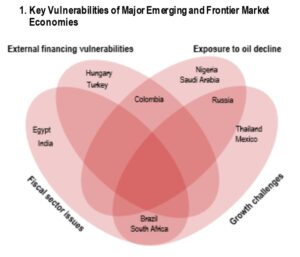The IMF released yesterday the first chapter of its half-yearly World Economic Outlook (WEO) which is due only in May/June 2020. The world has changed significantly since the publication of the last WEO in January this year. The Great Lockdown, as the report calls it, will result in the worst recession since the Great Depression, shrinking the global economy dramatically by -3%, thus surpassing the effects of the Great Recession of a decade back. But, as compared to the late 20s/early 30s, we are better off in having safety nets in place including for global cooperation in finance and health. With policy support, the economy could bounce back to a growth of 5.8% in 2021.
The extent of economic fallout is unpredictable, and would depend on
“…factors that interact in ways that are hard to predict, including the pathway of the pandemic, the intensity and efficacy of containment efforts, the extent of supply disruptions, the repercussions of the dramatic tightening in global financial market conditions, shifts in spending patterns, behavioral changes (such as people avoiding shopping malls and public transportation), confidence effects, and volatile commodity prices.”
To complicate this, “Many countries face a multi-layered crisis comprising a health shock, domestic economic disruptions, plummeting external demand, capital flow reversals, and a collapse in commodity prices. Risks of a worse outcome predominate.”
According to the report, the crisis will have to be dealt with in two phases: containment and stabilisation, followed by recovery. In the first phase, the disease needs to be contained, and the effect on people, firms, and economies cushioned with regulatory relaxations and appropriate funding. The pandemic has a significantly greater impact on specific sectors which need targeted fiscal, monetary, and financial market measures. These will have to be stepped up if the problems persist.

Central banks have provided monetary stimulus and liquidity facilities to reduce systemic stress. This has provided confidence and limited increase of the shock, making better recovery possible. The Report encourages supervisors to get banks to renegotiate loans to distressed households and firms. In the second phase, strong multilateral cooperation is required, to help economies facing twin crises of health and funding, and for extending aid to countries where health systems are weak. Cooperation is also required to contain the spread of the virus and to develop vaccine, without which no country is really safe.
© G Sreekumar 2021
For periodical updates on all my blog posts, subscribe for free at the link below:
https://gsreekumar.substack.com/
![]()